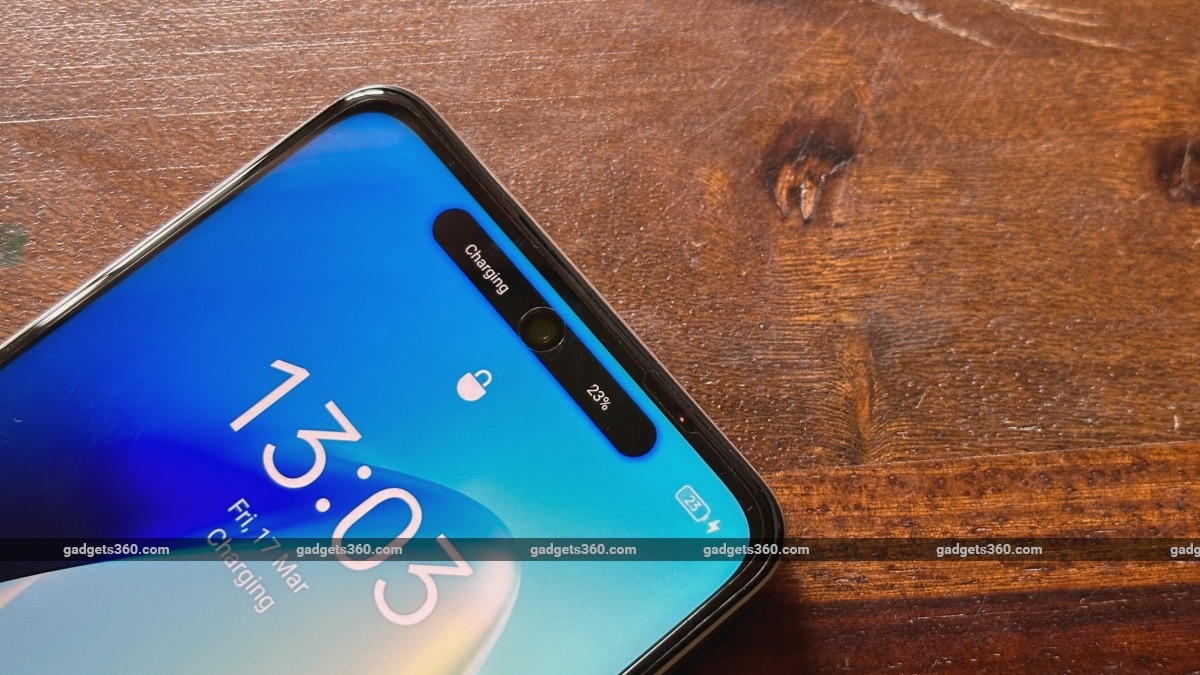After launching the C55 in Indonesia, Realme has finally launched its budget smartphone in India. The phone is very similar to the global variant and is even available in the same colours, indicating that very little has changed. This is also the first Android phone that we’ve seen to feature an iPhone-style Dynamic Island notification system around the selfie camera cutout. However, Realme’s implementation is far from what Apple cooked up on its iPhone 14 Pro and iPhone 14 Pro Max models last year. Read on to find out why.
First, the pricing. The Realme C55 has launched in India in three variants, all of which have LPDDR4X RAM and eMMC 5.1 storage. The 4GB RAM and 64GB variant is priced at Rs. 10,999, the 6GB RAM and 64GB storage variant is priced at Rs. 11,999, and the 8GB RAM and 128GB storage variant is priced at Rs. 13,999. The phone is will be going on sale on March 28.
Let’s start off with the phone’s most unique and yet, least advertised feature, which is what Realme calls ‘Mini Capsule’. It’s still in a beta state at the moment, according to Realme, just like the fingerprint scanner which doubled up as a heart rate monitor on the Realme 9 Pro+ 5G (Review). Users who want to give it a shot can enable it by heading to Settings > Realme Lab > Mini Capsule (enable) > Battery (enable).
Realme’s Dynamic Island implementation is called Mini Capsule
While it appears like a Dynamic Island-lookalike in terms of functionality, it isn’t…yet. While Apple’s Dynamic Island changes form to display different types of active notifications, Realme’s Mini Capsule is non-existent for the most part. It is really hard to tell that the feature is even enabled. The only time I noticed it was when I plugged in a charger and then saw the borders surrounding the hole-punch camera expand to the shape of an elongated pill telling me that the phone was charging using SuperVOOC, along with the battery percentage. A second later, it collapses and that’s about it!
To my surprise, the Mini Capsule does not remain active for more than a few seconds, so it’s easy to forget that it even exists. For now, Realme claims that it’s only being used for showing battery charging or low battery notifications, data usage (a flash notification when you reach a data limit), and step counting (again, as a pop-up notification).
Apart from it not being active or visible most of the time, it barely does the job that an LED notification light is capable of. More importantly, Mini Capsule is also not interactive like Apple’s Dynamic Island, so one cannot tap it to check things like battery status, which is also visible in the status bar. To be fair, Realme does say that the feature is a work-in-progress so hopefully Mini Capsule gets more useful with future updates.
The Realme C55 looks quite stylish for a budget smartphone
The Realme C55 belongs to the C series which is basically its budget line. I was a bit surprised to see Realme use its newer design language from its number series here. I received the Sun-shower colour of the Realme C55, which is both the finish’s name and the phone’s design feature/philosophy.
The phone’s frame and rear panel are made of polycarbonate and its display is protected by Panda Glass. The frame has a matte finish, while the rear panel has a unique-looking dual-tone finish which consists mainly of a matte finish and a smaller polished area around the rear-facing cameras. While the phone feels reasonably slim at 7.89mm, it does feel a bit heavy at 189.5g.
Realme UI 4.0 is loaded to the brim with preinstalled, third-party apps
There’s a 6.72-inch full-HD+ display with a 90Hz refresh rate and 180Hz touch sampling rate. Despite Realme’s emphasis that this display offers a 91.4 percent screen-to-body ratio, it’s hard to ignore that thick bezel at the bottom. The Realme C55 runs Realme UI 4.0 which is based on Android 13. During my brief time using the phone, I did notice plenty of third-party apps apart from the usual Realme-branded ones that come preinstalled.
The MediaTek Helio G88, a tried and tested SoC, might seem like a ray of hope for those who are stuck with a Realme C35 and its Unisoc T616 SoC, but it still seems a bit dated for a device in the Rs. 15,000 segment. It also misses out on 5G radios, which others in this segment such as the iQoo Z6 Lite 5G do possess.
The Realme C55 has only one camera that’s usable
The Realme C55 has two rear-facing cameras, one of which comes from the popular Realme GT Master Edition. This would be the primary 64-megapixel camera which fared well in our review. The second 2-megapixel camera is only used for gathering depth data. An 8-megapixel front-facing camera is in charge of selfies. The phone is powered by a 5,000mAh battery and gets 33W wired charging.
The Realme C55 comes with a 33W charger in the box
The Realme C55 is a decent upgrade to the C35, which failed to meet my expectations in every possible manner (apart from its slick design), even at its budget price. With the C55, Realme seems to have delivered on design once again, and its software and camera performance seems promising but I’ll leave my opinion for the full review.
At the moment, the Mini Capsule feature, while unique in an Android phone, seems to be in very early stages of development. I still have to test its usefulness in day to day usage, but as of now, it’s not something that should influence your buying decision. Still, it’s a feature which has a lot of potential if developed, especially when you consider the C55 costs less than a quarter of the Apple iPhone 14 Pro in India.

